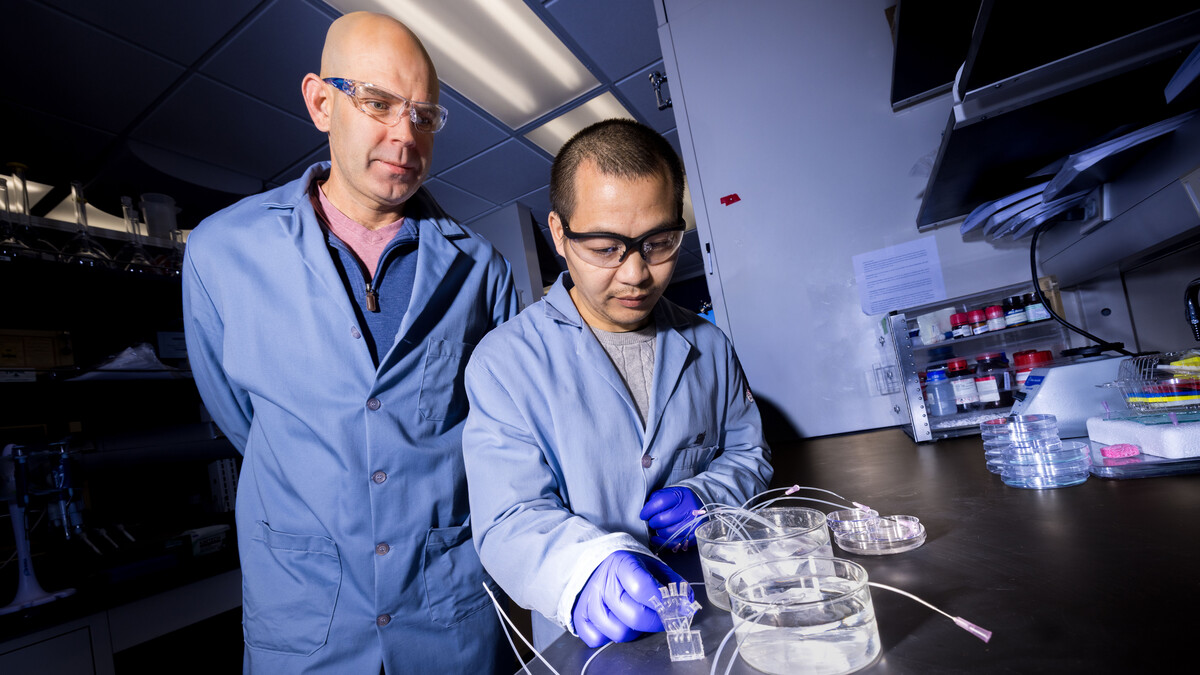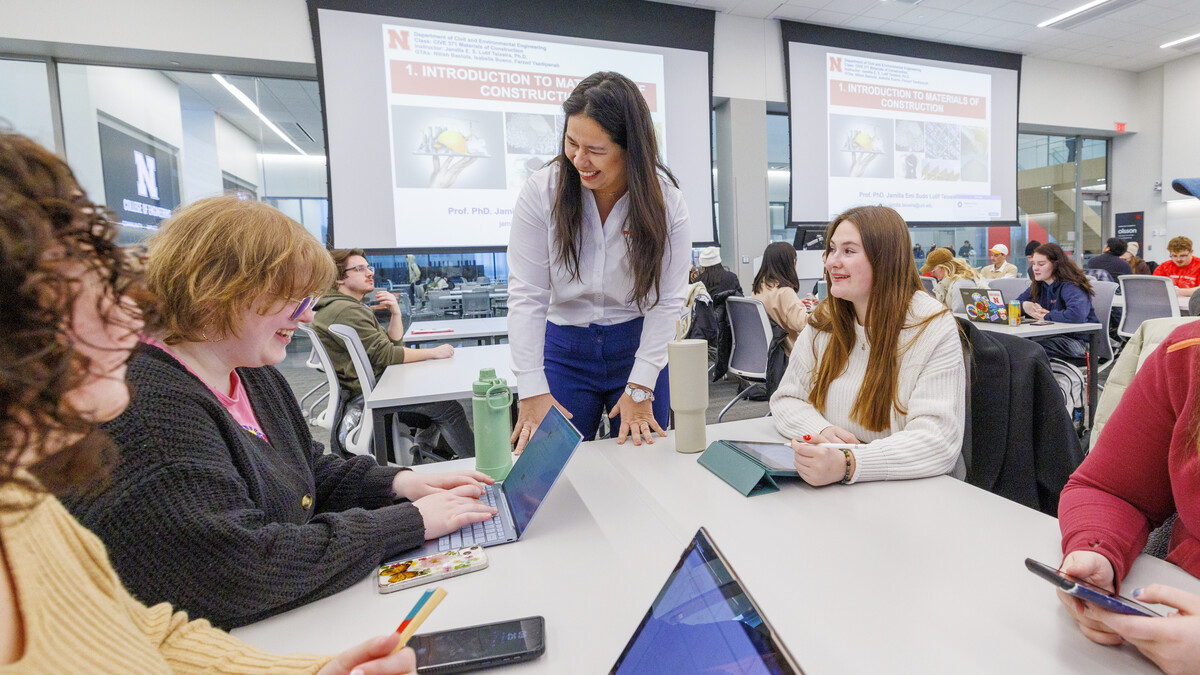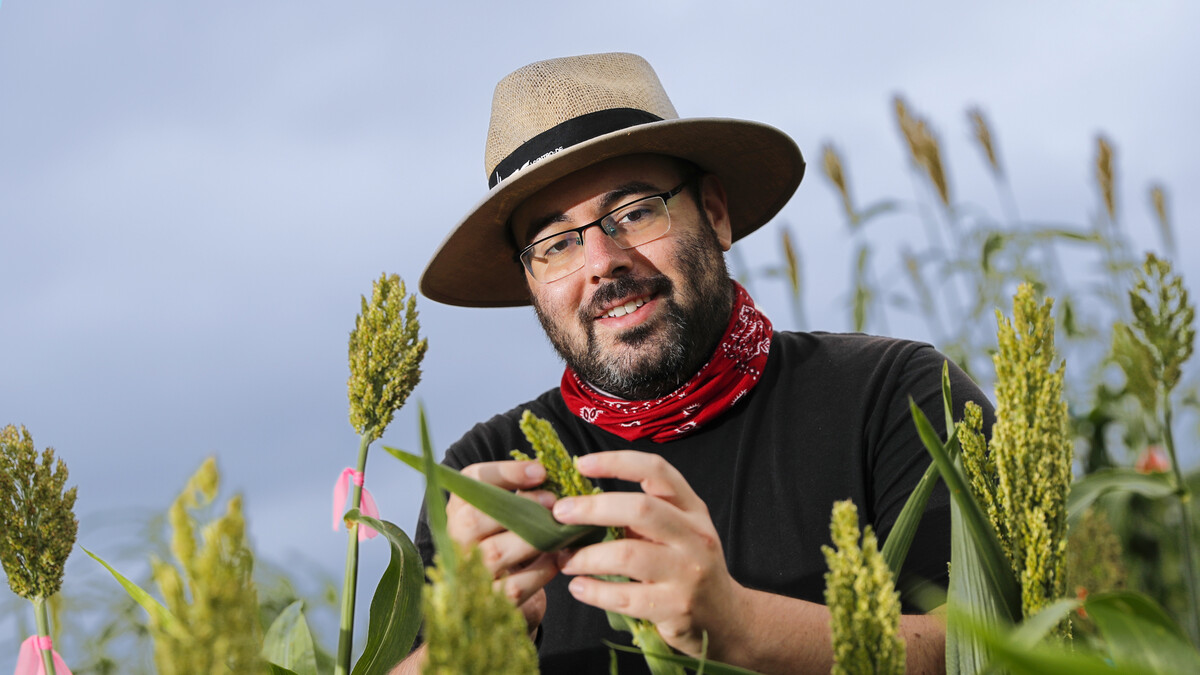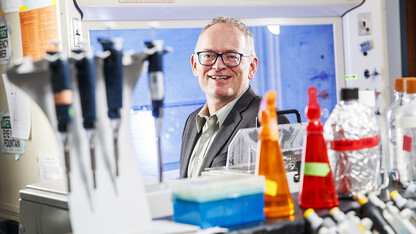
Two University of Nebraska–Lincoln faculty members provided expertise on stuttering and how the Biden administration can boost rural America for national news stories in January. The stories were among 40-plus featuring Husker faculty, staff, students, centers and programs during the month.
Naomi Rodgers, assistant professor of special education and communication disorders, was interviewed for a Jan. 20 story about stuttering on NPR’s Short Wave. Rodgers said the medical model of stuttering as a disability does not account for the social environment. She is pushing for a social model: stuttering as a neurodevelopmental variation that leads to a unique forward execution of speech sounds, produced in the context of language and social interaction.
“If we think about fluency on a spectrum, we have people that are highly fluent and we have people that are highly disfluent,” she said. “Then, stuttering reflects just a natural variation in fluency, which I think is really, really important. It situates stuttering as a difference and not as a disorder.”
Jessica Shoemaker, professor of law at Nebraska; Ann Eisenberg, assistant professor of law at the University of South Carolina; and Lisa R. Pruitt, Martin Luther King Jr. Professor of Law at the University of California, Davis, wrote a Jan. 21 piece for The Conversation on how the Biden administration can help rural America thrive and bridge the rural-urban divide. They suggested expanding high-speed internet to rural areas; helping local governments avoid going broke; reining in big agriculture; pursuing broad racial justice; and focusing on the basics.
The article was picked up by 20-plus media outlet, including the Houston Chronicle, San Antonio Express-News and Yahoo! News.
More coverage:
Matt Spangler, animal science, was interviewed for a Jan. 1 High Plains Journal article on cattle genetics. He noted two important breakthroughs in the field: the mixed model equation that can provide statistics for expected progeny differences; and the sequencing of the bovine genome and subsequent development of single nucleotide polymorphism “chips,” which enabled genomic prediction and the ability to increase the accuracy of EPDs.
Justin “Gus” Hurwitz, law, director of the Nebraska Governance and Technology Center, was the featured guest Jan. 4 on the Legal Talk Today podcast. He discussed the outdated regulatory framework surrounding robocalls and a current U.S. Supreme Court case related to the 1991 Telephone Consumer Protection Act.
Hurwitz was also the featured guest on the Technology Policy Institute’s Two Think Minimum podcast on Jan. 28. He discussed the NGTC and the rural digital divide, among other topics.
Jerry Volesky, Nebraska Extension range and forage specialist, was interviewed for a Jan. 4 BEEF magazine article on using stockpiled forages for winter grazing. “Grazing winter pastures has several benefits,” he said. “It can save as much as a dollar a day per cow, compared to feeding hay. On native range, there is little risk of damage to grasses because they are dormant, and winter stocking rates can be somewhat higher compared to the summer.”
Randy Saner, Nebraska Extension educator, hosted a recent UNL BeefWatch webinar, “Pricing Replacement Heifers.” Stories on the webinar appeared in Nebraska Farmer, DTN Progressive Farmer and Western Livestock Journal.
Saner and J. David Aiken, Nebraska Extension water and agricultural law specialist, wrote a recent BeefWatch article on things to consider when adding hunting leases to an agricultural enterprise. The article was featured in a BEEF Magazine blog and Western Livestock Journal.
Caroline Chaboo, adjunct assistant professor in insect systematics, has collaborated with Florida State’s Susan Kirmse on a new study showing that canopy beetles and flowering trees rely on each other in the Amazon. Mongabay published a Jan. 6 article on the research.
Research by Chris Tuan, civil and environmental engineering, on conductive concrete was mentioned in a Jan. 6 Governing article on the search for better ways to melt snow and ice.
Eric Berger, law, was interviewed for a Jan. 7 Jewish Insider article on how Merrick Garland’s former law clerks view his nomination to be the next U.S. attorney general. Berger clerked for Garland between 2003 and 2004. “He’s extremely smart and extremely hard-working and he expects a lot from his clerks, but he also treats them with kindness and compassion,” Berger said.
Greater exposure to seasonal coronaviruses, specifically those responsible for common colds, could help explain why most of sub-Saharan Africa has endured less severe SARS-CoV-2 outbreaks than many other areas of the world, according to research led by the University of Nebraska–Lincoln. Medical Xpress ran a Jan. 7 article on the research.
The U.S. Drought Monitor — produced jointly by the university’s National Drought Mitigation Center, the National Oceanic and Atmospheric Administration and the U.S. Department of Agriculture — was cited in a Jan. 8 Colorado Sun article on drought conditions in the state. According to the monitor, all of Colorado is in at least “moderate” drought, with 26.7% in the most intense category of “exceptional.” Deborah Bathke, School of Natural Resources, was also quoted in the story.
The monitor was also cited in a Jan. 13 BEEF magazine article on the beef outlook. As of Dec. 15, 67% of the United States was reported as abnormally dry, with 49% experiencing moderate drought, 34% suffering severe drought and 22% dealing with extreme drought.
In “When the Risen Dust Settles,” available on the new Alexander app, Chigozie Obioma focuses on the history of a Nigerian university headed by a charismatic Catholic priest. The work was mentioned in a Jan. 8 TheVibes.com article on the app. Obioma is the Ryan Associate Professor of English at Nebraska and an acclaimed author.
Obioma’s “The Strange Story of the World” was featured in a Jan. 11 Longreads article titled “Ten outstanding shorts stories to read in 2021.”
He has been selected to contribute a work of non-fiction exploring Nigeria to a Borough Press collection, The Bookseller reported Jan. 11.
He also wrote a Jan. 12 piece for Esquire magazine about a chance encounter during his time as a teenage street evangelist in Nigeria. Yahoo! News picked up the piece.
The Lied Center for Performing Arts is featured in a new National Endowment for the Arts document called “The Art of Reopening,” a guide to current COVID-19 practices among arts organizations. The Lied’s Music on the Move mobile concert series is highlighted in the document. American Theatre published a Jan. 8 article on the guide.
Aaron Berger, Nebraska Extension beef educator, wrote a recent article on the “big three” costs of cattle production — feed, labor/equipment and cow depreciation. The Rural Radio Network and Western Livestock Journal ran the article.
Jay Parsons, Nebraska Extension farm and ranch management specialist, wrote a recent article offering year-end updates on the Livestock Indemnity Program, a USDA disaster assistance program administered by the Farm Service Agency. Western Livestock Journal ran the article Jan. 8.
Judy Wu-Smart, entomology, was interviewed for a Jan. 10 Guardian article on pollution linked to the AltEn ethanol plant near Mead. She said every beehive maintained on a university research farm about a mile from Mead has died off, coinciding in timing with AltEn’s use of neonic-treated seed. She has also reported a scarcity of other insects common to the area, and has video recordings of birds and butterflies in the area that appear neurologically impaired.
A tweet by Josh Davis, associate vice chancellor for global affairs, was included in a Jan. 10 NJ.com article on Rep. Andy Kim going viral for helping clean up trash at the U.S. Capitol following the Jan. 6 storming of the building by pro-Trump extremists. “Andy Kim was a colleague and friend during my time at the U.S. Department of State,” Davis wrote. “I am proud to have served with him and proud of the example Congressman Kim is setting now. Light at the end of a dark day.”
The university’s High Plains Ag Laboratory, which recently celebrated its 50th anniversary, has helped bring about some notable advances in crop and livestock production. It enters its sixth decade with improved and expanded facilities, equipment and capacity, and a new role as the base camp for the Nebraska Variety Testing Program. Stories on the lab appeared in six Nebraska media outlets, Ag Update and The Fence Post.
F. John Hay, Nebraska Extension educator in biological systems engineering, was quoted in a Jan. 11 Successful Farming article on farmers tapping into the explosive growth of solar power generation. He described net excess generation, also known as net metering, in which solar power not used on the farm flows into the power grid to earn credit. The article also mentioned the Solar Electric Investment Analysis Series, a comprehensive guide on investing in solar generation written by Hay and Ohio State University’s Eric Romich.
The University of Nebraska–Lincoln has collaborated with the Army Research Lab, West Virginia University, Johns Hopkins University and consulting firm Booz Allen Hamilton to create the world’s largest facial recognition database of thermal images. FedScoop published a Jan. 11 article on the project.
Dominic Cristiano, master’s student in natural resource sciences, and his co-advisers, Elizabeth Van Wormer and Larkin Powell, both School of Natural Resources, are working to lower the health risks ticks pose in Nebraska by creating maps showing the territories of the four species considered the greatest threats in the state. Stories on the project appeared in KFXL, KHGI, Business Farmer and The Fence Post.
The Johnny Carson School of Theatre and Film has named Timothy Ganser as managing marketing director, Broadway World reported Jan. 12. He began his duties part time on Jan. 5 and will begin full time in March.
William G. Thomas III discussed his new book, “A Question of Freedom: The Families Who Challenged Slavery from the Nation’s Founding to the Civil War,” Jan. 12 on WYPR. Thomas is the Angle Chair in the Humanities and a professor of history at Nebraska.
Austin Duerfeldt, assistant extension educator with Nebraska Extension, wrote a recent UNL CropWatch article on tax planning for ag producers. Ag Update ran the article Jan. 12.
The College of Architecture’s Hyde Lecture Series was highlighted in Archinect’s Get Lectured feature on Jan. 15. The theme for the spring virtual lectures is “Building Justice: Design and Planning for a Just Society.”
The Nebraska Women in Agriculture Conference will award up to 50 scholarships to students and up to 10 scholarships to aspiring and beginning producers to attend the 2021 virtual conference, Progressive Cattle reported Jan. 18. The two-day event will offer both livestreaming and on-demand opportunities for attendees to learn how to better manage risk, improve their farms and ranches, and become more successful operators and business partners.
Kacie McCarthy, animal science, wrote a recent UNL BeefWatch article on maintaining condition in breeding bulls during winter. The information was featured in a Jan. 18 BEEF magazine blog entry.
Troy Smith, management, co-authored a recent study showing that after abusive behavior some managers fake nice rather than make nice with employees as a means of repairing their social image. Harvard Business Review published a Jan. 19 article on the research.
A wedge-shaped house designed by Jeffrey Day, architecture, was featured in a Jan. 19 Dwell article.
Brian Fuchs, a climatologist with the National Drought Mitigation Center, and Tala Awada, a physiological plant ecologist and associate dean of the university’s Agricultural Research Division, were interviewed for a Jan. 20 Harvest Public Media article on the effects of climate change on corn crops. Awada said some of the impacts, including overall warmer nights, require a bigger toolkit to manage future risk. “It has to be holistically, looking at the system as a whole,” she said. KCUR picked up the story.
Erin Hamel, a doctoral student in human sciences, is studying how early childhood educators use their planning time. The Sector published a Jan. 21 article on her research.
Food Management published a Jan. 22 article on changes to the university’s Dining Services due to the COVID-19 pandemic. The changes include scaling back self-service and offering mobile ordering. Dave Annis, director of dining services, was interviewed for the story.
Tami Brown-Brandl, biological systems engineering, appeared on a Jan. 26 segment on RFD-TV. She discussed technology that she and Husker colleagues developed that makes it possible for ag producers to quickly identify sick pigs in large production facilities.
A Twitter thread by James F. Tierney, law, was highlighted in a Jan. 28 Law & Crime article on Redditors on the subreddit WallStreetBets recently causing GameStop’s stock price to skyrocket. “Some people on the internet will be surprised when the SEC investigates them for market manipulation,” he wrote. He suggested that regulators might use Section 9 of the Securities Exchange Act of 1934 to deal with the alleged manipulation.
Rituraj Khound, doctoral student in agronomy, and his adviser, Dipak Santra, agronomy and horticulture, are working to develop modern tools for the genetic improvement of proso millet. Stories on the project have appeared in the Rural Radio Network, Scottsbluff Star-Herald, The Fence Post and Seed Today.
Troy Walz, beef systems extension educator, was interviewed for a Jan. 28 Drovers article on the importance of colostrum to young calves. “Getting our newborn calves off to a good start is key to long-term profits for a producer’s operation,” he said. “Colostrum plays an important part in that equation.”
Steve Niemeyer, Nebraska Extension educator, wrote a recent article on things to consider when grazing cattle. Western Livestock Journal ran the article Jan. 29.
Faculty, administration, student and staff appearances in the national media are logged at http://newsroom.unl.edu/inthenews. If you have additions to this list, contact Sean Hagewood at shagewood2@unl.edu or 402-472-8514. If you have suggestions for national news stories, contact Leslie Reed at lreed5@unl.edu or 402-472-2059.







